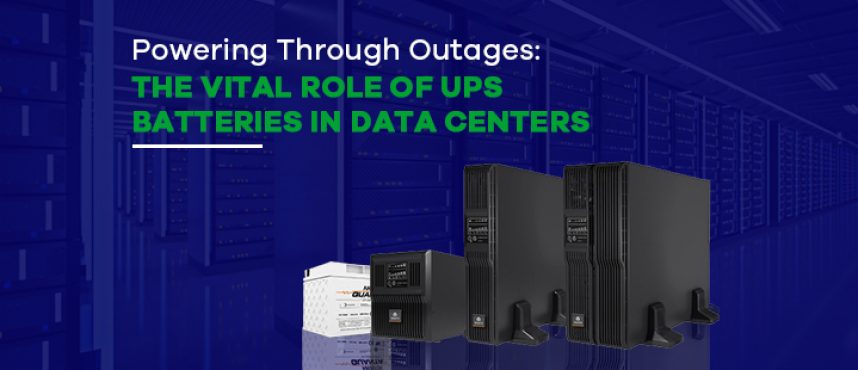Powering Through Outages: The Vital Role of UPS Batteries in Data Centers
In the digital age, where data is the currency of business operations, downtime is not an option. Data centers, the nerve centers of modern organizations, must maintain uninterrupted operations to ensure the seamless flow of information. Enter Uninterruptible Power Supply (UPS) batteries—the unsung heroes that play a pivotal role in safeguarding data centers against power disruptions. In this blog, we delve into the critical role of UPS batteries in data centers and explore how they enable businesses to power through outages with confidence.
The Data Center Dilemma
Data centers host an intricate ecosystem of servers, storage systems, networking equipment, and more. This bustling digital hub requires a constant and reliable power source to ensure that applications, services, and communications remain uninterrupted. Any power disruption, whether it’s a momentary glitch or a prolonged outage, can lead to financial losses, operational inefficiencies, and reputational damage.
Enter the UPS Battery
A UPS system acts as a bridge between the primary power source (usually the electrical grid) and the critical IT equipment in a data center. While the primary role of a UPS system is to provide a seamless transition from grid power to backup power during outages, it’s the UPS battery that serves as the lifeblood of this operation.
-
Instantaneous Power Transition
When grid power is lost, a UPS battery springs into action instantly, ensuring that critical equipment receives an uninterrupted power supply. This instantaneous transition prevents data loss, application disruptions, and potential hardware damage that can occur due to sudden power fluctuations.
-
Safeguarding Sensitive Electronics
Modern data center equipment is highly sensitive to power quality. Fluctuations, surges, and dips in voltage can wreak havoc on servers, storage, and networking gear. UPS batteries provide a stable power source, shielding sensitive electronics from potential harm and maintaining optimal performance.
-
Time to Mitigate Generator Start-Up Delays
In larger data centers, backup generators are often employed to provide extended power during lengthy outages. However, these generators take time to start up and reach operational capacity. UPS batteries bridge this gap, offering a seamless transition until the generators come online, thus preventing any disruption to operations.
-
Buy Time for Proper Shutdowns
In the event of an extended outage, UPS batteries offer valuable time for data center operators to initiate controlled shutdowns of non-essential equipment. This controlled process prevents abrupt shutdowns that can damage hardware or result in data corruption.
-
Protecting Data Integrity
Data centers are the repositories of critical information, and sudden power losses can lead to data corruption and loss. UPS batteries ensure that servers have enough power to complete ongoing processes, write cached data to storage systems, and initiate graceful shutdowns, preserving data integrity.
-
Enhancing Redundancy
Many data centers operate with redundant systems to ensure high availability. UPS batteries add an additional layer of redundancy, ensuring that even if one power source fails, the data center remains operational without any hiccups.
Conclusion
In the high-stakes world of data centers, UPS batteries are the unsung champions of reliability, stability, and data protection. Their role in powering through outages goes beyond providing backup energy; they are the ultimate insurance against downtime, enabling data centers to uphold their promise of constant availability. As businesses continue to rely on data-driven operations, investing in robust UPS systems and reliable UPS batteries becomes not just a wise choice, but an indispensable necessity for maintaining business continuity and safeguarding critical digital assets.







